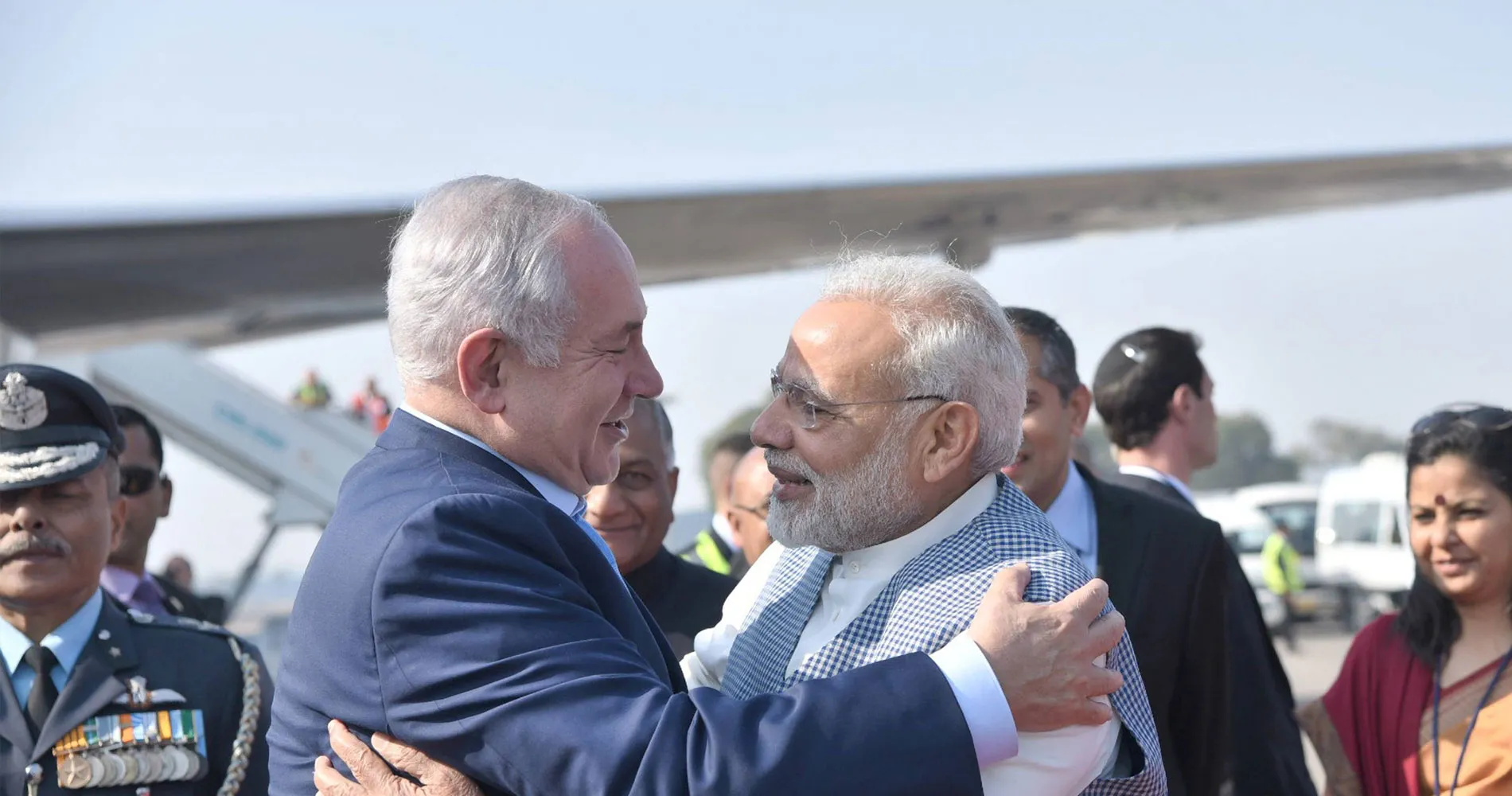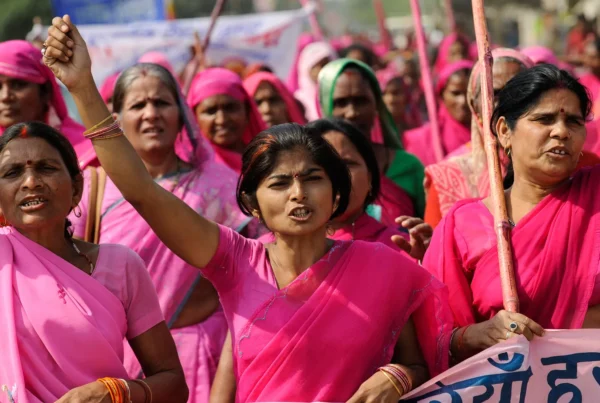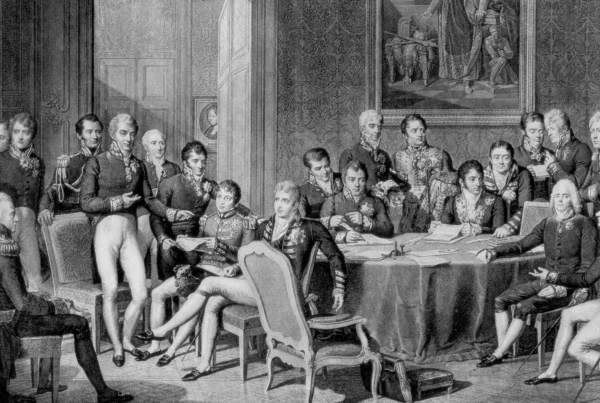Despite historical tensions, India and Israel have quietly built a strong partnership based on the shared ethnonationalism of Prime Ministers Modi and Netanyahu. Ranging from military deals to trade, Israel-India relations now represent a major tie for both nations. However, with both countries supporting each other’s increasingly Islamophobic and authoritarian rhetoric, this partnership brings troubling implications.
Reed McIntire
18 November 2024
Arabic version | Chinese version | Russian version | Spanish version
Prime Minister Narenda Modi has become India’s most vocal proponent of Israel since India won independence in 1947. Currently, the two countries share deep commercial and military ties, with both supporting the other’s conflicts against their Muslim neighbors.
India’s contemporary affinity for Israel is unprecedented in the country’s history. After Israel was founded in 1948, India typically maintained support for the Palestinian people, due to both its own large Muslim population as well as distaste for any trace of colonialism. Only in 1992 did India officially recognize Israel, becoming the last major non-Muslim state to do so. Since then, relations between the two nations have continued to strengthen, albeit quietly. PM Modi is breaking with this history by outwardly expressing his support for both the Israeli state and Benjamin Netanyahu.
As both Netanyahu and Modi are right-wing ethno-nationalists, their friendship is unsurprising however it is also indicative of worrying developments in Indian and Israeli society. Unlike Israel, India was intended to be a secular republic where sectarian and religious conflicts would not take center stage.
Modi’s party platform of Hindu nationalism has taken inspiration from Israel’s ethno-nationalist project, viewing it as a model for a potential future Hindu-centric society. This is not the first time Hindu nationalists have taken inspiration from other countries, as in the 20th Century they were inspired by Imperial Japan’s technocratic ethnostate.
For the Israelis, their relationship with India represents a massive portion of their arms industry’s profits. India is currently the number one customer of the Israeli arms industry, purchasing over $2 billion worth of arms annually. These purchases include small arms, drones, planes, bombs, and other weapons of war. Even on the tactical front, the Indian military takes inspiration from the Israelis. In 2017, Indian special forces conducted a raid in Pakistan to retaliate for a border skirmish, with Modi commenting that this sort of operation would normally be associated with Israel.
The Israeli military has been the inspiration for many other military operations around the globe as well. Law enforcement and security agencies from countless nations, such as the FBI or UK Metropolitan Police, send their personnel to Israel for training. Many of the tactics learned in these training sessions involved mass surveillance, racial profiling, and suppression of protestors or other dissenting voices.
While these deepening commercial, military, and ideological ties are beneficial to the dominant groups of either society, they bring troubling implications for the Muslim populations of both nations. Whereas previous PMs tried to maintain a delicate balance between the Hindu and Muslim parts of Indian society, Modi has engaged in an openly Islamophobic premiership, with his party supporters routinely engaging in hate crimes and pogroms against Muslims.
Simultaneously, Netanyahu’s extreme-right government has overseen the largest death toll in Palestine since the Nakba in 1948, as well as routinely depriving Muslims in Israel of their rights and condoning illegal settlements in the West Bank. Additionally, extremist Israeli National Security Minister Itamar Ben-Gvir entered the Al-Aqsa Mosque numerous times in 2024 to pray, openly provoking Muslims and drawing immediate criticism. The Al-Aqsa Mosque is one of the holiest sites in Islam and is also built atop the former Temple Mount, causing disputes between the Jewish and Muslim communities over rightful ownership of the area.
This brutal feedback loop is not only affecting Muslims though. In February 2024, the government of the Indian state Haryana deployed drones to shoot tear gas into crowds of protesting farmers. The Indian officials openly stated that this strategy was inspired by Israel’s treatment of Palestinians in the 2018 Great March of Return which saw over 200 killed and over 36 100 injured. Additionally, the Haryana government stated that they wished to replicate Israel’s database of suspect faces in order to “beef up security and intelligence network of the Haryana Police”.
However, India’s relationship with Palestine remains complicated. Despite the similarities and ties between Modi and Netanyahu, the Indian PM increased his country’s contributions to the UN Relief and Works agency for Palestinian Refugees (UNRWA), which Israel has repeatedly labeled as an extension of Hamas. Additionally, following the October 7 attacks, the Indian Ministry of External Affairs reaffirmed its support for the establishment of a Palestinian state. Paradoxically though, Modi and his government have not decried the bombardment and subsequent humanitarian crisis in Gaza in the year following 7 October 2023.
With Israel now expanding its campaign into Lebanon and facing retaliation from Iran or other regional actors, India’s ties in the region are being strained. Indian foreign policy has long relied on balancing ties to both the US and Israel as well as Arab states. As Netanyahu and the Israeli government now begin to paint its neighbors as future targets, the future of Indian foreign policy in the region remains uncertain.







